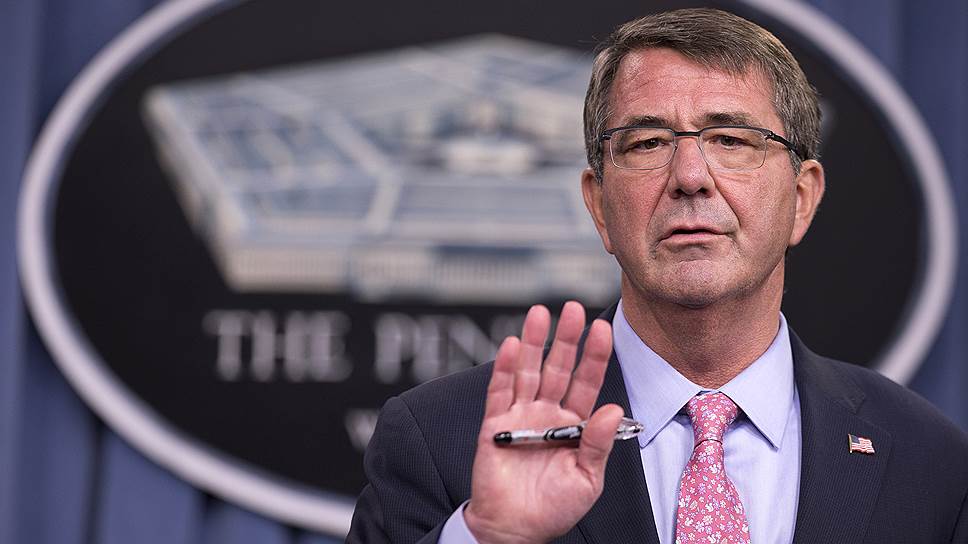
The Obama administration considers Russia the main threat to international security, and intends to increase the military potential of the U.S. to protect America and its allies. The Pentagon chief Ashton Carter’s unprecedented speech to the U.S. military in California continued the series of insults toward Moscow that he made during his tour of Asia. Although Carter also criticized China, his statements toward Russia were much tougher, which confirmed the impossibility of early normalization of bilateral relations. However, Kommersant’s sources in Russian state agencies believe this is not a new strategy, but the desire of the White House to avoid accusations of being too lenient [toward Russia] after the incipient rapprochement between the U.S. and Russia on Syria.
Carter announced the U.S. military’s plan to counter Russia during a conference at the Ronald Reagan Memorial Library in Simi Valley, California. This time Carter — in his desire to keep up with President Reagan, who called the Soviet Union an “evil empire” — blamed current Moscow policy for the crisis in the international security system. The Pentagon’s chief began by enumerating the charges against Moscow: “In Europe, Russia has been violating sovereignty in Ukraine and Georgia and actively trying to intimidate the Baltic states. Meanwhile, in Syria, Russia is throwing gasoline on an already dangerous fire, prolonging a civil war that fuels the very extremism Russia claims to oppose.”
Carter began to resemble the style of Ronald Reagan to the greatest extent when he announced that Russia is attempting to disrupt the strategic balance with weapons of mass destruction. “Most disturbing, Moscow’s nuclear saber-rattling raises questions about Russian leaders’ commitment to strategic stability, their respect for norms against the use of nuclear weapons,” said Carter.
According to Carter, America “[does] not seek a cold, let alone a hot, war with Russia… But make no mistake; the United States will defend our interests, our allies, the principled international order, and the positive future it affords us all,” Carter assured the audience. In this regard, he indicated that the Pentagon’s arsenal has a new set of measures to curb Russia — starting with the modernization of their nuclear arsenal and the creation of modern weapons systems, including a new strategic bomber and laser weapons, and ending with an increase of military aid to Ukraine.
“We are adapting our operational posture and contingency plans as we — on our own and with allies — work to deter Russia’s aggression, and to help reduce the vulnerability of allies and partners,” Carter said. Although Carter also blamed China for destabilizing the world, his criticism of Russia was far more extensive and rigid. Moreover, when Carter was speaking about China during his recent tour in Asia, he announced the intention to build Beijing into a common system of Asian security, and promised to discuss this topic during an upcoming visit to China.
Carter’s speech in California was not the only insult he made toward Russia. Earlier, the head of the Pentagon made a number of high-profile statements during his visit to the U.S. Joint Base Pearl Harbor-Hickam in Hawaii. The containment of Russia was the main theme of Carter’s dialogue with the service personnel.
Carter accused Moscow of adopting “hybrid warfare” and the use of “little green men” in Ukraine. He stated that the United States’ answer to this should be the “rebalancing” of military capability on the European continent. “We are making some adjustments in Europe to recognize the fact that Russia is not taking the course that we hoped it would,” he announced. Carter also added: “The Europeans are asking for this. NATO is asking for it and we are going to provide it.”
Even though Mr. Carter assured service personnel that a recreation of the Cold War is out of the question, these recent statements are the most uncompromising from any representative of a U.S. administration since the collapse of the Soviet Union and the end of the bloc confrontation. These statements confirm that the conditions for an early normalization of bilateral relations are still lacking.
However, sources from within the Russian state structure who were interviewed by Kommersant perceived Carter’s statements in a reserved manner. They pointed out that similar exacerbations occur each time the diplomats of the two countries manage to bring their positions on certain issues closer, particularly when it comes to Syria. “Usually, any positive interactions are followed by harsh comments from the Pentagon or the State Department. Thus, the Obama administration is trying to balance its Russian foreign policy line and also to avoid any possible accusations of being too lenient toward Moscow,” said one of Kommersant’s sources.

Leave a Reply
You must be logged in to post a comment.